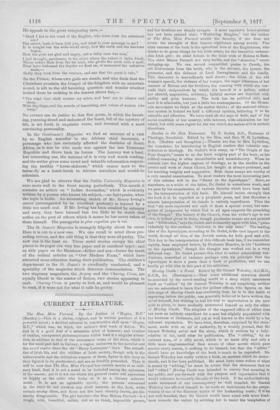CURRENT LITERATURE.
The Hon. Miss Ferrard. By the Author of "Hogan, M.P." (Bentley.)—Thia is a clever, original, and in certain portions of it a powerful novel ; a decided advance in constructive skill upon "Hogan, M.P.," which was, we think, the author's first work of fiction. We find in it a good deal of a saturnine kind of humour, and touches of sudden, unexpected picturesqueness which lend it a singular attrac- tion, in addition to that of the uncommon scene of the story, which is for the most part laid in Galway, a region unknown to the novelist and the novel reader since the old "Harry Lorrequer " days. The actuali- ties of Irish life, and the oddities of Irish society, though only in the unfavourable and the ridiculous aspects of them, figure in this story as they figured in its predecessor, and are as forcibly presented. Thus it will be seen that The Hon. Miss Ferrard has certain merits of no ordi- nary kind, that it is not a novel to be included among the ephemera of the season; yet it is not one which the general reader will appreciate so highly as the critic who looks at it as a literary achieve- meat. It is not an agreeable novel ; the persons concerned in the story do not awaken any vivid interest, at the best, while certain among them, and those not the least cleverly drawn, are dis- tinctly disagreeable. The girl heroine—the Hon. Helena Ferrard—is a rough, wild, beautiful, sullen, and as we think, impossible person,
and her brothers are simply savages. A more repulsive home-picture has not been painted since " Wutbering Heights," but the author of The Hon. Miss Ferrard avoids the ferocity, if she does not attain the strength of that famous nightmare among novels. The chief success of the book is the episodical love of the Engliebman, who thinks to do groat things for his Irish estate, for the beautiful, untame- able Irish girl ; its chief failure is the brief visit of Helena to Bath. The elder Misses Ferrara arc very feeble, and the " situation " wants
stringing-up. We can accord unqualified praise to Cawth, the old Irishwoman from the north, who is the servant, the tyrant, the protector, and the defamer of Lord Darraghmore and his family. This character is marvellously well drawn ; the idiom of the old woman's speech, the violence of her temper, the eager bitterness of her censure of Helena and the brothers, the cunning with which she con- ceals their malpractices by which she herself is a gainer, withal her shrewd, ungracious, arbitrary, faithful service are depicted with ability and grim humour. The book has its political side, and here it is admirable, but just a little too contemptuous. Of the Home- rule movement we think as the author thinks; of the national-educa- tion system in Ireland we hold a different opinion, believing it to be valuable and effective. We have read all she says of both, and of the social condition of her country, with interest, with admiration for her talent, but with some regret for the use which alao makes of it in certain directions.






























 Previous page
Previous page